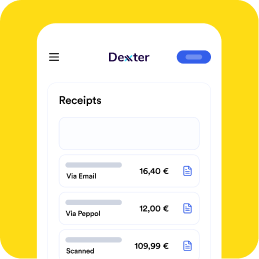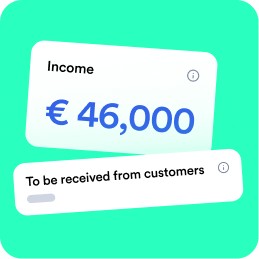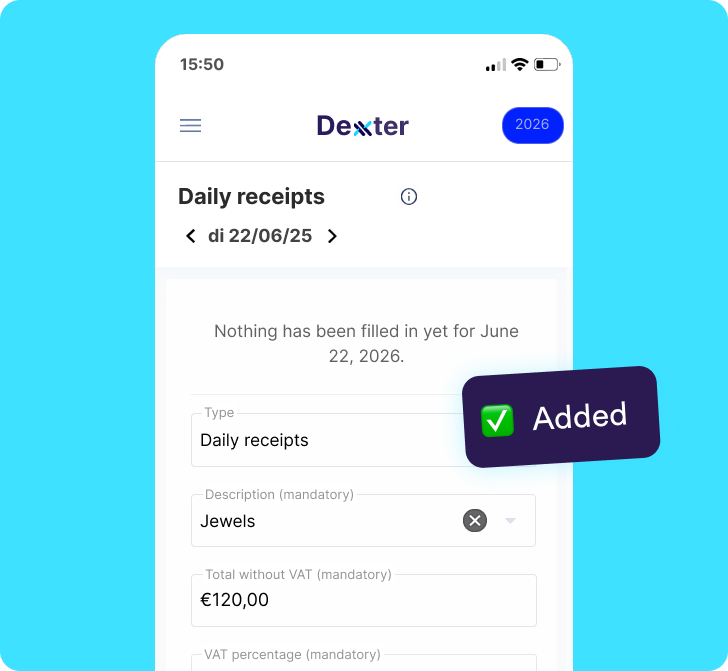You’ve started your own business, and while enjoying the freedom, creativity (and stress) of being a sole proprietor, you’re wondering: ‘How likely is it, really, that the tax authorities will suddenly state on my doorstep?’
Are you also unsure what to expect from that dreaded tax audit? If the answer is ‘yes’, you have come to the right address here. We reveal the facts and myths from the famous tax audits.
Can I be audited by the taxman?
Yes, you can always be audited by the government.
🖥️ Although manual checks are becoming less and less common, the tax authorities are certainly not sitting still. Indeed, a lot of checks happen automatically. Therefore, if your data are not in line with expectations, you are more likely to get an additional manual check.
So do your accounting as if you will have an audit every year. That is the safest way. Be honest, be correct and don’t hesitate to immediately type extra information to certain expenses in Dexxter.

Tip from an accountant
For expenses, write a small note for clarification, that way you can remember for yourself later why it was a business expense.
Why do tax audits happen?
Even if you don’t commit fraud, sometimes it happens that you make small mistakes in accounting without realising it. Or maybe you view financial matters from other perspectives than the experts from the tax authorities.
That’s where a tax audit comes in. It is actually a kind of reality check to make sure that your accounts are in line with the various law books.
Those law books are sometimes like a maze full of corridors you can get lost in. They often leave room for interpretation and can be quite complex. Therefore, it is the tax auditor’s job to translate these laws into the real world and examine whether your accounts indeed meet all the requirements.
What are the tax authorities allowed to check?
You used to have isolated audits, and the tax authorities would come and check 1 part of your taxes: personal income tax, vAT…. The auditor who came by had one subject area and only came to check that.
Now this has changed drastically and an inspector has to check everything. The tax authorities will no longer view each domain separately but will check the correctness of all domains together.
What is the taxman likely to check?
📄 The tax authorities will probably look at your sales invoices, credit notes and daily receipts. In addition, it will randomly take a look among all the documents proving your purchases. The csv files from your professional bank account(s) will also be subject to a check.
The tax authorities may take all the documents needed to determine your taxable income. He may also question you to copy digital data such as emails and stock lists. But an auditor sitting down at your computer himself without your permission is not allowed.
Control based on customer list
🧑 You as the purchasing party are probably stated on other Belgian suppliers’ customer lists. So the tax authorities will know roughly what to expect in terms of order of magnitude in your accounts based on your Belgian suppliers’ customer lists. That will be checked briefly. Does it deviate significantly? Then you can always have an explanation for that, of course.
Checking on the basis of IC declarations
📖 In addition, the tax authorities will check whether you are stated on foreign suppliers’ IC declarations. Say you professionally purchase something from Bol.com Netherlands, you will end up there on Bol’s Dutch IC declaration. Is that purchase then correctly in your accounts? Or do you have an explanation as to why it is not in your accounts?
Which assessment years can the tax authorities check?
The tax authorities can check your accounts up to 3 years after the assessment year. If fraud is suspected, the term can be extended to 7 years.
Suppose you put something in your accounts now that might seem like a strange purchase without context, note it directly along with your expenses. In the last step while booking an expense, you can note extra information.
Don’t assume you will know it later! Figures from 2023 can be checked until the end of 2026. That’s very far in the future to know then what was special about that expense in 2023 and why you stopped that in your accounts.
Why am I being audited by the tax authorities?
With computer selection, the tax authorities use specific criteria to analyse your data. If your figures deviate from what is normal, a signal may go off. This could be due to, for example, unusually high or low profit margins compared to your sector, or the occurrence of exceptional losses.

The taxman compares your figures with market values, which can be a cause for audit.
How likely are you to get a tax audit as a sole proprietor?
This is difficult to estimate, a guideline could be that companies are audited about 15% yearly, and sole proprietors 1%.
❗ Above all, don’t forget that a lot of audits are also automatic.

Tip:
Even if everything is correct, on average you will have checks once every 15 years. Although strong deviations are always possible.
❌ Giving an indication is difficult, some companies will have audits 3 years in a row, others will see no trace of their tax auditor for 20 years. Do your filed tax returns scream that something is wrong? Then it becomes harder not to get audited.
How can I avoid being audited?
🤔 Sometimes you hear: don’t bring in too many restaurant costs, otherwise you’ll get audited. The reality is that the tax authorities cannot see the amount of restaurant costs in a sole proprietor’s filed declarations. This is true for corporations, but not for sole proprietors.
When you file your personal income tax, the taxman only sees your gross margin and the sum of your expenses. So a sole proprietor has no control because there are too many restaurant costs in the accounts.
A sole proprietor has tax audit because the margins in the returns filed are not correct according to certain market values. Once during the tax audit, it can then be concluded that the restaurant is indeed way too high.

Did you know?
The tax authorities cannot see the amount of restaurant costs in the filed declarations of a sole proprietor.
To avoid being audited, your margins must remain compliant in the long term. When you file vAT declarations, the tax authorities can see in them how many trade goods you purchase and how much turnover that generates. They know which sector you are enabled within, so they do have some market-based dates on that. Substantially deviating from those market-based margins can be grounds for an audit.
It is not a disaster to deviate drastically from that! You can always have an explanation that 100% explains why you deviate from what can be expected.
Tips on bookkeeping and tax audits
1️⃣ Always file every return on time! Late filed declarations have many disadvantages, but above all they increase the risk of tax audits. Make sure you always file every declaration before the deadline.
2️⃣ Are you exempted from VAT and do you buy something from other European suppliers on your company number? Then 0% VAT will be charged on this due to reverse charge.
The tax authorities know about these transactions! Either question a new invoice in which you do not give your company number, so that this foreign party does charge VAT. Either you have to submit a special vAT declaration in order to still pay VAT.
You can find more information in this video:
✅ So be sure not to forget to do this. The tax authorities know about these transactions and will revert to them otherwise.

Dexxter helps!
If you enter as exempted from VAT and invoice with 0% VAT, you will get notifications in Dexxter.
You must then either ask for a new invoice as a private person or submit a special vAT declaration.
How does a tax audit work?
A tax audit is always announced well in advance. Almost always, a lot of documents are first requested by e-mail, such as diaries of sales and purchases. Sometimes this is followed by some follow-up questions and can also be the immediate end of the audit.
Alternatively, these documents can prepare for a physical audit, so that the auditor can do some checking beforehand. Then a date and time will be agreed and the actual audit will take place at your company’s registered office.

No worries!
An auditor is not a bogeyman! This is someone who comes to check your accounts against the various tax rules. Does something seem odd in your accounts? If so, the auditor will question it in extra context.
Did you make a mistake in your bookkeeping after all? That too is not a disaster. You will obviously have to pay the taxes you would otherwise have had to pay if the mistake had not been in your accounts.
You may also have to pay a fine or interest, but as long as it turns out that you have tried to act honestly and sincerely, these fines are not too high.
Can I be fined if I am audited by the tax authorities?
You can, but don’t confuse fines with paying taxes you would otherwise have had to pay as well.
If the auditor decides that your original return is incorrect, there are two options:
- You close an agreement and pay the extra part of taxes to be paid.
- If you do not reach an agreement, you can explain your reasoning within the month. Is the taxman not convinced? Then you risk not only an increase in taxable income (and the corresponding higher taxes) but also administrative fines.
So suppose the tax auditor refuses €1,000 in charges, you will still have to pay those taxes, which will be about half. On the other hand, you may also have to pay extra:
1️⃣ Interest on the unpaid part. You would otherwise have paid that €500 1 year earlier via your tax letter. Now you pay it 1 year later, so the state had to wait longer for tax revenue. Hence interest is charged.
2️⃣ On top of that, you may also effectively have to pay a penalty. This can be a fixed amount or a percentage of the amount of paid taxes.

















